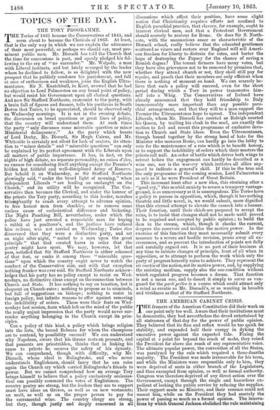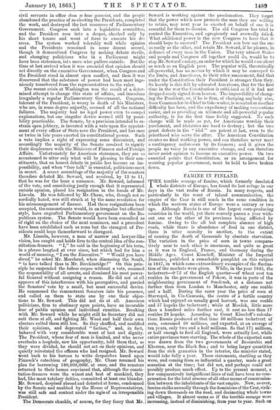THE AMERICAN CABINET CRISIS.
THE framers of the American Constitution did their work on one point only too well. Aware that their institutions must be democratic, they had nevertheless the dread entertained by all statesmen of that day for the power of public opinion. They believed that its flux and reflux would be too quick for stability, and expended half their energy in dyking the executive power against the expected tide. Fixing the capital at a point far beyond the reach of mobs, they raised the President far above the reach of any representative voice. The ultimate popular power, the convention of all the States, was paralyzed by the rule which required a three-fourths majority. The President was made irremovable for his term, and while the Ministers were responsible only to him they were deprived of seats in either branch of the Legislature, and thus exempted from opinion, as well as formal authority. Congress was therefore deprived of any direct action over the Government, except through the single and hazardous ex- pedient of locking the public service by refusing the supplies. Their support made no Minister, and their censure could not unseat him, while on the President they had scarcely the power of passing so much as a formal opinion. The innova- tions by which General Jackson abolished the rule maintaining civil servants in office dam se bene gesserint, and the people abandoned the practice of re-electing the Presidents, completed the work, and destroyed the last resources of Parliamentary Government. Congress sank into a legislative committee, and the President rose into a despot, checked only by his short tenure and want of force to execute his de- crees. The system worked tolerably well while opinion and the Presidents remained in some decent accord, though it demoralized Congress by making debate sterile, and changing politicians who in a Parliament might have been statesmen, into mere wire pullers outside. But the time at last arrived when it was essential that opinion should act directly on the executive Government, when Congress and the President stood in almost open conflict, and then it was discovered that the substance of power had been most inge- niously transferred from the representatives to the ruler.
The recent crisis at Washington was the result of a deter- mined attempt to change this state of affairs, and introduce irregularly a regular Parliamentary Government. Congress, tolerant of the President, is weary to death of his Ministers, who are, in some degree unjustly, accused of all the national failures. The majority had no legal power even to compel explanations, but one singular device seemed still by possi- bility practicable. The Senate, by a provision intended to re- strain open jobbery, is invested with a veto upon the appoint- ment of every officer of State save the President, and has once or twice in late years exerted its constitutional power. Such a veto implies a right of expressing some discontent, and accordingly the majority of the Senate resolved to signify their displeasure with the Ministers of Finance and of Foreign Affairs. Unfortunately for American statesmen, they are so accustomed to utter only what will be pleasing to their con- stituents, that an honest debate in public has become an im- possibility, and when "free talk" is essential, politicians meet in secret. A secret assemblage of the majority of the senators therefore debated Mr. Seward, and resolved, by 13 to 11, that he was for the hour a nuisance. Mr. Seward, informed of the vote, and considering justly enough that it represented outside opinion, placed his resignation in the hands of Mr. Lincoln. He was followed by Jr. Chase, who, though not so cordially hated, was still struck at by the same resolution for his mismanagement of finance. Had these resignations been accepted, the remonstrants would, in an irregular but effectual style, have engrafted Parliamentary government on the Re- publican system. The Senate would have been consulted as of right on the choice of the next nominees, and a precedent have been established such as none but the strongest of Pre- sidents could hope thenceforward to disregard.
Mr. Lincoln, however, a man of narrow and lawyer-like vision, has caught and holds firm to the central idea of the con- stitution-framers. "I," he said in the beginning of his term, in a phrase laughed at ever since, but which had for him a world of meaning, "lam the Executive." "Would you have dared," he asked Mr. Morehead, when discussing the South, "to have talked thus to Mr. Breckiuridge ?" On this prin- ciple he suspended the habeas corpus without a vote, assumed the responsibility of all arrests, and dismissed his most power- ful General without assigning a reason. He did not at all approve of this interference with his prerogative, and parried the Senators' vote by a small, but most successful device. He summoned the remonstrant Senators into his presence, and called on them to state one by one their objec- tions to Mr. Seward. This did not do at all. American politicians, firm to obstinacy upon points, have an incurable fear. of public opinion and individual enmities. Breaking with Mr. Seward while he might still be Secretary did not suit them at all, and fighting Mr. Weed and half their own electors suited them still less. So they shuffled, and modified their opinions, and deprecated "faction," and, in fact, behaved with very considerable want of tact and dignity. The President, whose fear of man is limited, and who never overlooks a loophole, saw his opportunity, told them that, as they were divided, he should not act on their opinions, and quietly reinstated the officers who had resigned. Mr. Seward went back to his bureau to write despatches based upon Pinnock's catechism of geography, Mr. Chase resumed his plan for borrowing 180,000,000/. at once, and the senators returned to their homes convinced that, although the consti- tution-framers were the wisest and best of mankind, they had, like most tutelary deities, committed at least one blunder. Mr. Seward. despised abroad and detested at home, condemned by the Senate and snubbed by the House of Representatives, was still safe and content under the tegis of an irresponsible President.
The Democrats chuckle, of course, for they fancy that Mr. Seward is working against the proclamation. They forget that the power which now protects the man they are willing to retain, may next year be exerted on behalf of one it is essential for them to dismiss. The old Congress has tried to control the Executive, and egregiously and avowedly failed. What additional power is the new Congress to have that it should hope to succeed? The President can bow out the one as easily as the other, and retain Mr. Seward, if he pleases, in defiance of every man in the Union. The very utmost States and people and Congress all together could do, would be to stop Mr. Seward's salary, an order for which he would care about as much as an English peer. The popular will, theoretically all-powerful, has no nerves by which it may be conveyed to the limbs, and Americans, to their utter amazement, find that under the Constitution their President is stronger than they. So keenly is this felt by educated Americans' that for the first time in the war the Constitution is criticized as if it had not dropped ready signed from heaven. The impossibility of chang- ing the President, or, if he is firm, of changing anybody else, from Commander-in-Chief to tide-waiter, is resented as no other difficulty has been, and the expediency of making conventions easier, and so providing an ultimate and all-powerful popular authority, is for the first time feebly suggested. No such change will be made as yet, for Americans worship their parchment, and idolatries are hard to destroy ; but the two great defects in the " idol " are patent at last, even to the priesthood who serve the altar. The American Constitution creates no final working power, and can therefore never meet a contingency unforeseen by its framers ; and it gives the people no voice in any executive change, and can therefore never assist opinion to become an executive power. On two essential points that Constitution, as an arrangement for securing popular government, must be held to have broken down.































 Previous page
Previous page